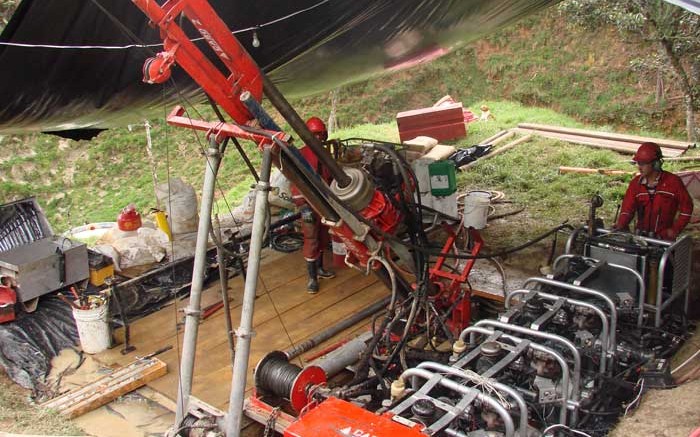VANCOUVER — Things are coming together for Vancouver-based junior Red Eagle Mining (TSXV: RD) at its wholly owned San Ramon gold deposit in Antioquia, Colombia.
In mid-September the company released a preliminary economic assessment (PEA) on the deposit, which models an underground gold mine that would operate at 1,000 tonnes per day. With a mine plan in hand, Red Eagle looks poised to advance San Ramon through its permitting stages, and hit construction in 2015.
According to CEO Ian Slater, San Ramon will go underground for two reasons.
First, the company had contemplated an open-pit operation that would mine oxide materials via heap leaching, but 45,000 metres of drilling during the interim outlined a deposit that was better suited to underground mining.
“The granodiorite is oxidized down to 50 metres, so we were anticipating the shear zone would be oxidized much deeper than that, but our drilling revealed it was actually the opposite,” Slater says during an interview. “Only the top 20 metres or so of the shear zone was oxidized, and a lot of that had been mined previously.”
As it turns out, an underground operation was more economically viable for Red Eagle. Due to the nature of the orebody at San Ramon, the company found it would operate at a lower head grade if it pursued an open-pit model.
Underground measured and indicated resources at San Ramon total 2.7 million tonnes grading 5.1 grams gold per tonne for 446,000 contained oz., which is a higher grade than global resources of 10.3 million tonnes averaging 1.81 grams gold for 601,000 contained oz.
So the company focused on a whole-ore, carbon-in-leach (CIL) operation that would best use the underground resources that were housed in fresh rock. Red Eagle’s model at San Ramon carries upfront development costs of US$84 million, and would produce 51,000 oz. gold annually over a 10-year mine life at cash costs of US$540 per oz.
San Ramon would crank out 514,000 oz. gold over its life from 3.6 million tonnes of ore. Red Eagle’s CIL plant is slated to produce gold doré with recovery rates pegged at 93%. Slater points out that the plant would accommodate a 2,000-tonne-per-day expansion, in case any of the satellite deposits on Red Eagle’s 320 sq. km Santa Rosa property package can provide suitable mill feed.
And the project’s economics appear attractive. Assuming a US$1,300 per oz. gold price, San Ramon carries a US$113-million net present value at a 5% discount rate, as well as a 38% internal rate of return and 1.7-year payback period. San Ramon’s early years would be boosted by higher grades, with run-of-mine grades pegged at an average of 6.5 grams gold over the first three years.
“The second thing I’d like to point out with an underground operation is permitting. Antioquia is unique in Colombia since it is the one department where the central government has delegated the permitting responsibilities regionally, which is due to its long history with underground mining,” Slater says, explaining that if an operation mines under 2 million tonnes of rock annually — including waste — it can be permitted by regional authorities in Medellin.
“From a social-licence perspective there are no open-pit gold mines in Antioquia, so it would have been a huge education process, and that’s ongoing, but we didn’t want to be the pioneer on that front. We’ve built a great relationship with the local community, and they’re supportive of underground mining, while they’re quite tentative of open-pit operations because they don’t understand them,” he adds.
In terms of financing, Slater says the company plans to raise US$10 million via equity placements in the next months to fund construction early next year on a decline at San Ramon.
Red Eagle remains well capitalized after reporting US$9 million in cash and equivalents at the end of June. The company will file San Ramon’s environmental-impact statement later this year, and expects to have the project permitted in 2014.
“For the development capital we’ll definitely do a portion of that via debt financing. We’ve started those conversations and it’s been positive. There is a large appetite for financing new gold mines, in my experience,” Slater says. “I’ve been encountering brand-new funds recently that have been put together for just that purpose.”
And the company should have quite a bit of equity room, considering its tight share structure. Since acquiring Santa Rosa in 2011, Red Eagle has raised US$45 million, but only has 59 million shares outstanding. In early September financial outfit Appian Natural Resources Fund acquired 3.5 million shares of Red Eagle in the market, bringing its stake in the company to 15.3%.
Red Eagle’s shares have traded a 52-week range of 17¢ and 60¢, and jumped 30% over the first two weeks of October en route to a 26¢ close at press time.


Be the first to comment on "Red Eagle closes in on production at San Ramon"